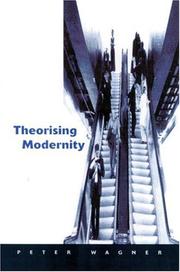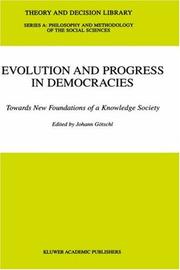| Listing 1 - 6 of 6 |
Sort by
|
Book
ISBN: 9066172606 Year: 2001 Publisher: Amsterdam De Balie
Abstract | Keywords | Export | Availability | Bookmark
 Loading...
Loading...Choose an application
- Reference Manager
- EndNote
- RefWorks (Direct export to RefWorks)
Public welfare --- Social change --- 316.42 --- 316.42 Social change. Sociale ontwikkeling. Sociale veranderingen. Modernisering. Evolutie .Sociale revolutie. Modernisme --- Social change. Sociale ontwikkeling. Sociale veranderingen. Modernisering. Evolutie .Sociale revolutie. Modernisme --- Netherlands --- Social policy.

ISBN: 9786610369294 1280369299 144621706X 1412933765 9781412933766 9781446217061 6610369291 9781280369292 0761951466 0761951474 9780761951469 9780761951476 Year: 2001 Publisher: London : SAGE,
Abstract | Keywords | Export | Availability | Bookmark
 Loading...
Loading...Choose an application
- Reference Manager
- EndNote
- RefWorks (Direct export to RefWorks)
'Theorising Modernity' argues that sociology has not lost its ability to provide critical diagnoses of the present human condition because it has stopped considering the philosophical requirements of social enquiry.
Sociology --- Civilization, Modern. --- Modern civilization --- Modernity --- Civilization --- Renaissance --- Philosophy. --- History --- Civilization, Modern --- 316.42 --- 316.42 Social change. Sociale ontwikkeling. Sociale veranderingen. Modernisering. Evolutie .Sociale revolutie. Modernisme --- Social change. Sociale ontwikkeling. Sociale veranderingen. Modernisering. Evolutie .Sociale revolutie. Modernisme --- Philosophy --- Sociological theory building --- Sociology - Philosophy

ISBN: 2880744318 9782880744311 Year: 2001 Publisher: Lausanne: Presses polytechniques et universitaires romandes,
Abstract | Keywords | Export | Availability | Bookmark
 Loading...
Loading...Choose an application
- Reference Manager
- EndNote
- RefWorks (Direct export to RefWorks)
Cet ouvrage traite des nombreuses problématiques soulevées par la sociologie urbaine à savoir les dynamiques métropolitaines, les mobilités spatiales et les migrations, les inégalités sociales et les fragmentations urbaines, les notions de temps et de quartier, ainsi que l'emprise de l'économie sur le politique et les formes urbaines.
Cities and towns --- Sociology, Urban --- Villes --- Sociologie urbaine --- Analyse urbaine --- Economie urbaine --- Espace urbain --- Metropole regionale --- Migration --- Mobilité urbaine --- Morphologie urbaine --- Politique urbaine --- Quartier --- Ville --- Mobilité sociale --- Politique de l'urbanisme --- Temps --- Théorie de l'urbanisme --- Urban sociology --- 911.375 --- 316.42 --- Urban settlements (their study and geography). Towns. Cities --- Social change. Sociale ontwikkeling. Sociale veranderingen. Modernisering. Evolutie. Sociale revolutie. Modernisme --- 316.42 Social change. Sociale ontwikkeling. Sociale veranderingen. Modernisering. Evolutie .Sociale revolutie. Modernisme --- Social change. Sociale ontwikkeling. Sociale veranderingen. Modernisering. Evolutie .Sociale revolutie. Modernisme --- Métropole --- Mobilité résidentielle --- GEOGRAPHIE URBAINE --- SOCIOLOGIE URBAINE --- VILLES
Book

ISBN: 9062830773 Year: 2001 Publisher: Muiderberg Coutinho
Abstract | Keywords | Export | Availability | Bookmark
 Loading...
Loading...Choose an application
- Reference Manager
- EndNote
- RefWorks (Direct export to RefWorks)
316.422 --- 316.42 --- 316.324.7 --- Social history --- -Social history --- #KVHB:Sociologie --- #KVHB:Maatschappij --- #KVHB:Modernisering --- 130.2 --- 130.2 Filosofie van de cultuur. Cultuurfilosofie. Cultuursystemen. Kultuurfilosofie --- Filosofie van de cultuur. Cultuurfilosofie. Cultuursystemen. Kultuurfilosofie --- Descriptive sociology --- Social conditions --- History --- Sociology --- 316.324.7 Industriele maatschappij --- Industriele maatschappij --- 316.42 Social change. Sociale ontwikkeling. Sociale veranderingen. Modernisering. Evolutie .Sociale revolutie. Modernisme --- Social change. Sociale ontwikkeling. Sociale veranderingen. Modernisering. Evolutie .Sociale revolutie. Modernisme --- 316.422 Innovatie. Modernisering --- Innovatie. Modernisering --- #SBIB:316.7C170 --- Cultuursociologie: culturele groei, vooruitgang, stagnatie, technologische verandering, cultuurbewegingen --- Social change --- cultuursociologie --- Sociological theories --- modernisme --- individualisering

ISBN: 1402000634 9048158427 9401715041 Year: 2001 Volume: 31 Publisher: Dordrecht Kluwer Academic Publishers
Abstract | Keywords | Export | Availability | Bookmark
 Loading...
Loading...Choose an application
- Reference Manager
- EndNote
- RefWorks (Direct export to RefWorks)
In a ground-breaking series of articles, one of them written by a Nobel Laureate, this volume demonstrates the evolutionary dynamic and the transformation of today's democratic societies into scientific-democratic societies. It highlights the progress of modeling individual and societal evaluation by neo-Bayesian utility theory. It shows how social learning and collective opinion formation work, and how democracies cope with randomness caused by randomizers. Nonlinear `evolution equations' and serial stochastic matrices of evolutionary game theory allow us to optimally compute possible serial evolutionary solutions of societal conflicts. But in democracies progress can be defined as any positive, gradual, innovative and creative change of culturally used, transmitted and stored mentifacts (models, theories), sociofacts (customs, opinions), artifacts and technifacts, within and across generations. The most important changes are caused, besides randomness, by conflict solutions and their realizations by citizens who follow democratic laws. These laws correspond to the extended Pareto principle, a supreme, socioethical democratic rule. According to this principle, progress is any increase in the individual and collective welfare which is achieved during any evolutionary progress. Central to evolutionary modeling is the criterion of the empirical realization of computed solutions. Applied to serial conflict solutions (decisions), evolutionary trajectories are formed; they become the most influential causal attractors of the channeling of societal evolution. Democratic constitutions, legal systems etc., store all advantageous, present and past, adaptive, competitive, cooperative and collective solutions and their rules; they have been accepted by majority votes. Societal laws are codes of statutes (default or statistical rules), and they serve to optimally solve societal conflicts, in analogy to game theoretical models or to statistical decision theory. Such solutions become necessary when we face harmful or advantageous random events always lurking at the edge of societal and external chaos. The evolutionary theory of societal evolution in democracies presents a new type of stochastic theory; it is based on default rules and stresses realization. The rules represent the change of our democracies into information, science and technology-based societies; they will revolutionize social sciences, especially economics. Their methods have already found their way into neural brain physiology and research into intelligence. In this book, neural activity and the creativity of human thinking are no longer regarded as linear-deductive. Only evolutive nonlinear thinking can include multiple causal choices by many individuals and the risks of internal and external randomness; this serves the increasing welfare of all individuals and society as a whole. Evolution and Progress in Democracies is relevant for social scientists, economists, evolution theorists, statisticians, philosophers, philosophers of science, and interdisciplinary researchers.
Changement social --- Cultural evolution --- Cultural transformation --- Culture [Evolution of ] --- Democracy --- Democratie --- Démocratie --- Evolutie [Sociale ] --- Evolution sociale --- Inspraak in het beleid --- Overlegcultuur --- Self-government --- Social change --- Social evolution --- Sociale evolutie --- Sociale verandering --- #SBIB:324H20 --- #SBIB:324H60 --- #SBIB:021.IO --- Change, Social --- Cultural change --- Societal change --- Socio-cultural change --- Social history --- Culture, Evolution of --- Culture --- Evolution --- Politologie: theorieën (democratie, comparatieve studieën….) --- Politieke socialisatie --- Philosophy and science. --- Philosophy. --- Economic theory. --- Social sciences. --- Philosophy of Science. --- Philosophy, general. --- Economic Theory/Quantitative Economics/Mathematical Methods. --- Social Sciences, general. --- Behavioral sciences --- Human sciences --- Sciences, Social --- Social science --- Social studies --- Civilization --- Economic theory --- Political economy --- Social sciences --- Economic man --- Mental philosophy --- Humanities --- Science and philosophy --- Science
Book
ISBN: 9546075108 Year: 2001 Publisher: Sofia Les éditions LIK
Abstract | Keywords | Export | Availability | Bookmark
 Loading...
Loading...Choose an application
- Reference Manager
- EndNote
- RefWorks (Direct export to RefWorks)
316.42 --- Social change. Sociale ontwikkeling. Sociale veranderingen. Modernisering. Evolutie .Sociale revolutie. Modernisme --- 316.42 Social change. Sociale ontwikkeling. Sociale veranderingen. Modernisering. Evolutie .Sociale revolutie. Modernisme --- Post-communism --- Social change --- Change, Social --- Cultural change --- Cultural transformation --- Societal change --- Socio-cultural change --- Social history --- Social evolution --- Postcommunism --- World politics --- Communism --- Bulgaria --- Québec (Province) --- Kempek (Province) --- Canada East --- Province de Québec --- Province of Québec --- Provinsie van Quebec --- Kvebek (Province) --- Правінцыя Квебек --- Pravintsyi︠a︡ Kvebek --- Квебек (Province) --- Κεμπέκ (Province) --- Kebekio (Province) --- Kebek (Province) --- 퀘벡 주 --- Kʻwebek-ju --- Kʻwebek (Province) --- Kupaik (Province) --- קוויבק (Province) --- Ḳṿibeḳ (Province) --- Quebecum (Province) --- Kvebeka (Province) --- Kvebekas (Province) --- Kébeki (Province) --- Кэбэк (Province) --- ケベック州 --- Kebekku-shū --- Kebekkushū --- ケベック (Province) --- Kebekku (Province) --- Provincia Québec --- קוויבעק (Province) --- Kvebeks (Province) --- 魁北克 (Province) --- Kuibeike (Province) --- Kui bei ke (Province) --- Lower Canada --- Bulgaristan --- Volksrepublik Bulgarien --- Republic of Bulgaria --- Republika Bŭlgariya --- Republika Bŭlgarii︠a︡ --- People's Republic of Bulgaria --- République bulgare --- Narodna Republika Bŭlgariya --- Bŭlgariya --- Narodna republika Bŭlgarii︠a︡ --- Bŭlgarii︠a︡ --- Bugarska --- Bulgarien --- Bulharsko --- Voulgaria --- Burugaria --- NRB --- Narodnai︠a︡ Respublika Bolgarii︠a︡ --- Bulgario --- Republika Bulgaria --- Bulgarie --- Bolgarija --- Bâlgarija --- République de Bulgarie --- República de Bulgaria --- България --- Република България --- Болгария --- Bolgarii︠a︡ --- Республика Болгария --- Respublika Bolgarii︠a︡ --- 保加利亚 --- Baojialiya --- 保加利亚共和国 --- Baojialiya Gongheguo --- Social conditions
| Listing 1 - 6 of 6 |
Sort by
|

 Search
Search Feedback
Feedback About UniCat
About UniCat  Help
Help News
News